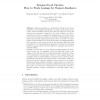6 search results - page 1 / 2 » Practical Zero-Knowledge Proofs for Circuit Evaluation |
IMA
2009
Springer
14 years 5 days ago
2009
Springer
IACR
2011
12 years 5 months ago
2011
We present a method to compile Yao’s two-player garbled circuit protocol into one that is secure against malicious adversaries that relies on witness indistinguishability. Our ap...
CRYPTO
1995
Springer
13 years 9 months ago
1995
Springer
Abstract. In this paper we present an eficient protocol for “Committed Oblivious Transfer” to perform oblivious transfer on committed bits: suppose Alice is committed to bits 0...
IACR
2011
12 years 5 months ago
2011
Abstract. Tampering attacks are cryptanalytic attacks on the implementation of cryptographic algorithms (e.g., smart cards), where an adversary introduces faults with the hope that...
JPDC
2007
13 years 5 months ago
2007
Virtual circuits can reduce routing overheads with irregular topologies and provide support for a mix of quality of service (QOS) requirements. Information about network loads and...


